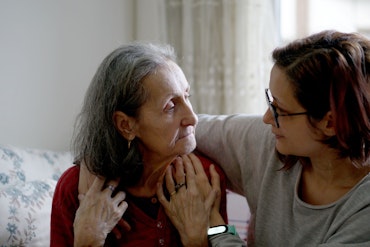Experts suggest a ‘food first’ philosophy in aged care
The importance of nutrition in aged care is currently in the spotlight after a paper published in Nutrition and Dietetics journal noted a trend amongst aged care facilities of spending less on raw foods, and more on nutritional supplements

Up to half of residents in aged care are at risk of malnourishment or are malnourished (Source: Shutterstock)
Published earlier this month, the paper includes data from 817 surveyed residential facilities from 1 July 2014 to 30 June 2016 and saw that not only did the daily spend on food fall from $6.39 per person per day to $6.08, there was also a 128 percent, or 50 cent, increase per resident per day of spend on nutritional supplements and meal replacements.
Accredited Practising Dietician and Spokesperson for the Dieticians Association of Australia, Joel Feren, says that the published findings are concerning.
“Anecdotally I have heard of this happening,” he says. “It’s worrying because we are dealing with a population that is often in need of increased energy and protein intake.
“Reducing the food budget means that residents aren’t getting nutritionally adequate intake from their food.
“Often up to half the residents in aged care are at risk of malnourishment or are malnourished and this can lead to hospitalisation, increased illness, increased falls and higher mortality.
“I think it would be in the best interest of providers to nip it in the bud and spend the money on good quality foods and aim to meet the residents nutritional needs that way.”
The ‘food first’ philosophy is also one that HammondCare’s Executive Chef Peter Morgan-Jones works to, and encourages among others, through his work and participation in programs to also follow.
“It is cheaper to have good food than to use supplements which can be quite expensive,” he says.
“There can certainly be a need for the use of nutritional supplements in some residents and patients but where possible I think food is the way to go.”
While Mr Feren suggested that the bottom dollar could be behind the trend, Mr Morgan-Jones suggests that an increase of frailer incoming residents are accountable for the increase in nutritional supplement spend.
“One factor that could be contributing is that people are coming into care homes frailer because they are often being encouraged to stay at home longer,” Mr Morgan-Jones explains.
“These residents could even be on the supplements when they come into the care home.”
While the reason behind the trend is unclear, Mr Feren feels that if the move toward nutritional supplements over food is due to cost, that it is ‘counter intuitive’.
“Supplements are expensive and while they may reduce the initial costs on food in the short term, the long term impacts, if facilities could look ahead, are much more than it would be to provide a nutritional food first diet full of good quality foods,” Mr Feren explains.
“If a resident is being fed a balanced and healthy, nutritional meal, and are still lacking in the important energy or proteins that they need, nutritional supplements sure do have their role to play.
“With the long term in mind and the associated risks, I always encourage the facilities I work with to spend more on better quality food and more nourishing food to reduce the risks and reliance on supplements.”























